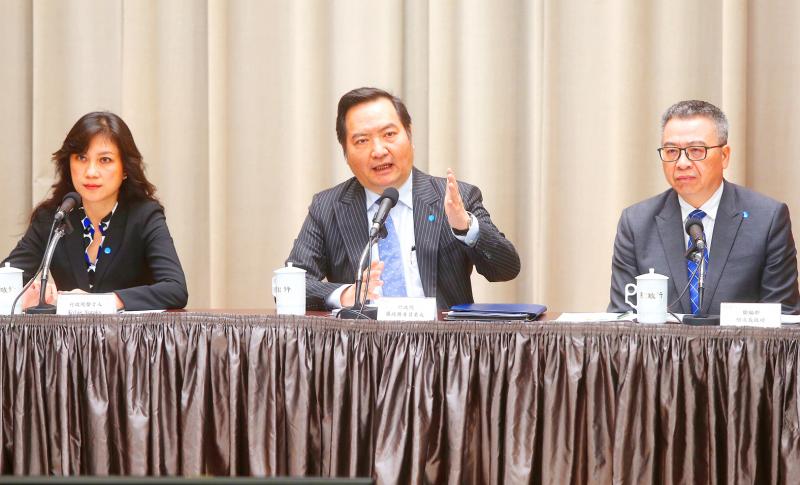The Executive Yuan yesterday approved a new bill for a lay judge system, to take effect in 2023, as part of its judicial reform efforts.
Premier Su Tseng-chang (蘇貞昌), who signed off on the bill, hailed it as a historic step.
The bill largely mirrors one submitted by the Judicial Yuan to a previous legislative session, with a handful of adjustments, Minister Without Portfolio Lo Ping-cheng (羅秉成) told a news conference at the Executive Yuan in Taipei.

Photo: CNA
The scope of cases in which lay judges, who the bill refers to as “citizen judges,” can take part has been reduced from cases that warrant a prison sentence of at least seven years to ones that could impose a 10-year term.
The original draft would have meant that the number of cases that lay judges could review would be about 1,200 per year, which would be too many when testing a new system, Lo said.
Although the current version lowers that number to between 500 and 600, the Executive Yuan has asked the Judicial Yuan and Legislative Yuan to consider further limiting the scope of cases amid concern the new system would put a strain on the judiciary, he said.
The two branches could further limit the nature of cases and charges that could be handled by lay judges, but gradually expand the scope after the system has been running smoothly for a period of time, he said.
The new bill retains the proposal that lay judges be allowed to review cases of deliberate homicide, and while the previous version did not stipulate a starting date, the new version sets a date of Jan 1, 2023.
There are some differences between the Judicial Yuan’s and Executive Yuan’s proposals.
The Judicial Yuan’s draft has an article that evidence must be disclosed to defendants in three stages, while the Executive Yuan’s proposes that all evidence be disclosed to defendants, plaintiffs and victims at once.
The two versions would be presented side-by-side for lawmakers to consider during legislative reviews, Lo said.
Under the bill, Republic of China nationals who are at least 23 years old and have resided in the jurisdiction of their district courts for at least four months would be obligated to serve at some point as lay judges or backups.
They would serve alongside three career judges and five other lay judges, with the court president acting as the presiding judge, the Executive Yuan bill states.
A district court should inform a local government of the number of lay judges it needs for the upcoming year before Sept. 1, and local governments would then be required to provide a roster of lay judges, selected by a lottery draw, and provide the roster to the local courts within a month.
People who are assigned to serve as lay judges for a certain hearing would be informed at least 30 days prior to the date of the hearing, the bill states.

Taipei has once again made it to the top 100 in Oxford Economics’ Global Cities Index 2025 report, moving up five places from last year to 60. The annual index, which was published last month, evaluated 1,000 of the most populated metropolises based on five indices — economics, human capital, quality of life, environment and governance. New York maintained its top spot this year, placing first in the economics index thanks to the strength of its vibrant financial industry and economic stability. Taipei ranked 263rd in economics, 44th in human capital, 15th in quality of life, 284th for environment and 75th in governance,

The Sports Administration yesterday demanded an apology from the national table tennis association for barring 17-year-old Yeh Yi-tian (葉伊恬) from competing in the upcoming World Table Tennis (WTT) United States Smash tournament in Las Vegas this July. The sports agency said in a statement that the Chinese Taipei Table Tennis Association (CTTTA) must explain to the public why it withdrew Yeh from the WTT tournament in Las Vegas. The sports agency said it contacted the association to express its disapproval of the decision-making process after receiving a complaint from Yeh’s coach, Chuang

Control Yuan Secretary-General Lee Chun-yi (李俊俋) tendered his resignation last night, admitting that he had misused a government vehicle, as reported by media. His resignation was immediately accepted by the Control Yuan. In a statement explaining why he had resigned, Lee apologized for using a Control Yuan vehicle to transport his dog to a pet grooming salon on May 20. The issue first came to light late last month, when TVBS News reported that Lee had instructed his driver to take the dog to the salon. The news channel broadcast photos that it said were taken by an unnamed whistle-blower, which purportedly showed the

Democratic Progressive Party caucus chief executive Rosalia Wu, front, grabs the pennant in a dragon boat race hosted by Qu Yuan Temple in the Shuanghsi River in Taipei’s Beitou District yesterday.